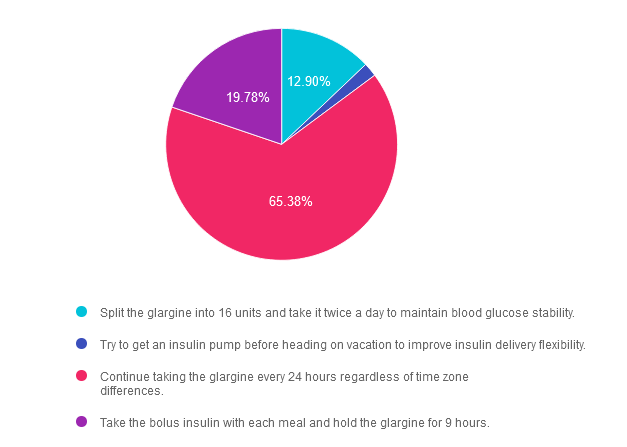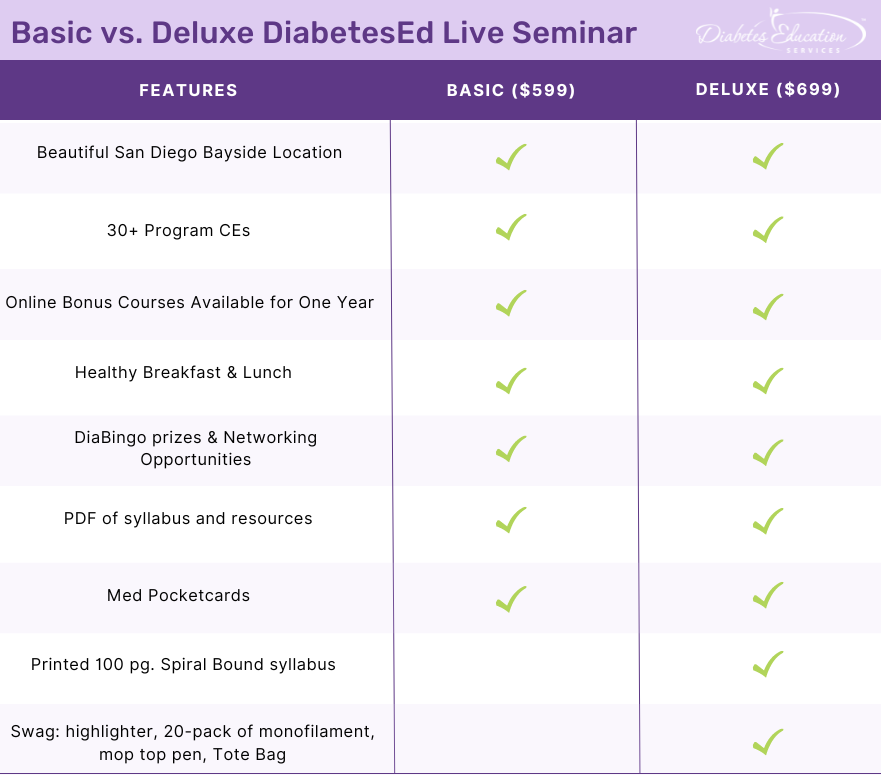
For last week’s practice question, we quizzed participants on living with diabetes & traveling to different timezones. 65% of respondents chose the best answer. We want to clarify and share this important information, so you can pass it on to people living with diabetes and your colleagues, plus prepare for exam success!
Before we start though, if you don’t want any spoilers and haven’t tried the question yet, you can answer it below: Answer Question
Question: BT is heading to the south of France for a 25th wedding anniversary vacation. They usually take 32 units of glargine at 10 PM each night along with 5-7 units of bolus insulin with meals. There is a nine hour time difference between the United States and France.
They ask you how to adjust their basal insulin. What is the best response?
Answer Choices:
- Split the glargine into 16 units and take it twice a day to maintain blood glucose stability.
- Try to get an insulin pump before heading on vacation to improve insulin delivery flexibility.
- Continue taking the glargine every 24 hours regardless of time zone differences.
- Take the bolus insulin with each meal and hold the glargine for 9 hours.

Getting to the Best Answer
If you are thinking about taking the certification exam, this practice test question will set you up for success. Test writers anticipate possible answers based on the details in the question. They will wave those “juicy answers” right under your nose. Your job is to weed through the particulars, pluck out the most important elements and choose the BEST answer.
Answer 1 is incorrect. 12.90% chose this answer. “Split the glargine into 16 units and take it twice a day to maintain blood glucose stability.” Although a tempting answer, this action does not address or solve the issue of determining insulin injection timing in a different time zone.
Answer 2 is incorrect. 1.94% of you chose this answer. “Try to get an insulin pump before heading on vacation to improve insulin delivery flexibility.” This approach offers too big of an intervention based on BT’s question of when to dose their insulin in a different time zone.
Answer 3 is correct. About 65.38% of respondents chose this. “Continue taking the glargine every 24 hours regardless of time zone differences.” YES, GREAT JOB. Sometimes the most direct and simplest answer is the best answer. While traveling across time zones, as long as BT takes the basal insulin about every 24 hours and the bolus insulin with meals, they will be able to maintain their usual approach. However, accurate carb counting for French pastries and three course meals is a whole different challenge. : -)
Finally, Answer 4 is incorrect. 19.78% chose this answer. “Take the bolus insulin with each meal and hold the glargine for 9 hours.” The first part of this answer is correct, but the second part isn’t really accurate and it is too vague and confusing to make this answer the best choice. This is a great example of a “juicy answer”.
We hope you appreciate this week’s rationale! Thank you so much for taking the time to answer our Question of the Week and participate in this fun learning activity!
Want to learn more about this practice question?
Join us LIVE in San Diego for our DiabetesEd Training Conference
October 11-13th, 2023

Two Registration Options

Join Coach Beverly and Team for two and a half days of knowledge-sharing, fun, networking, games with prizes, and “aha” moments in beautiful San Diego.
You don’t want to miss this one-of-a-kind learning opportunity. Get away from all those daily responsibilities and immerse yourself in a fun and intensive conference with plenty of networking opportunities.
Attendees will leave this conference with new tools and a more complete understanding of the latest advances in diabetes care, from medications to technology to Medical Nutrition Therapy!
Bring your colleagues and enjoy our friend discount.
Our team expertly translates the complex science of diabetes into understandable terms while keeping it real, practical, and fun.
Team of expert faculty includes:
- Diana Isaacs, PharmD, BCPS, BC-ADM, BCACP, CDCES – Educator of the Year, 2020
- Coach Beverly Thomassian, RN, MPH, CDCES, BC-ADM
- Ashley LaBrier, MS, RD, CDCES, Diabetes Program Coordinator
All hours earned count toward your CDCES Accreditation Information
Sign up for Diabetes Blog Bytes – we post one daily Blog Byte from Monday to Friday. And of course, Tuesday is our Question of the Week. It’s Informative and FREE! Sign up below!
The use of DES products does not guarantee the successful passage of the diabetes certification exams. CBDCE & ADCES does not endorse any preparatory or review materials for the certification exams, except for those published by CBDCE & ADCES.









